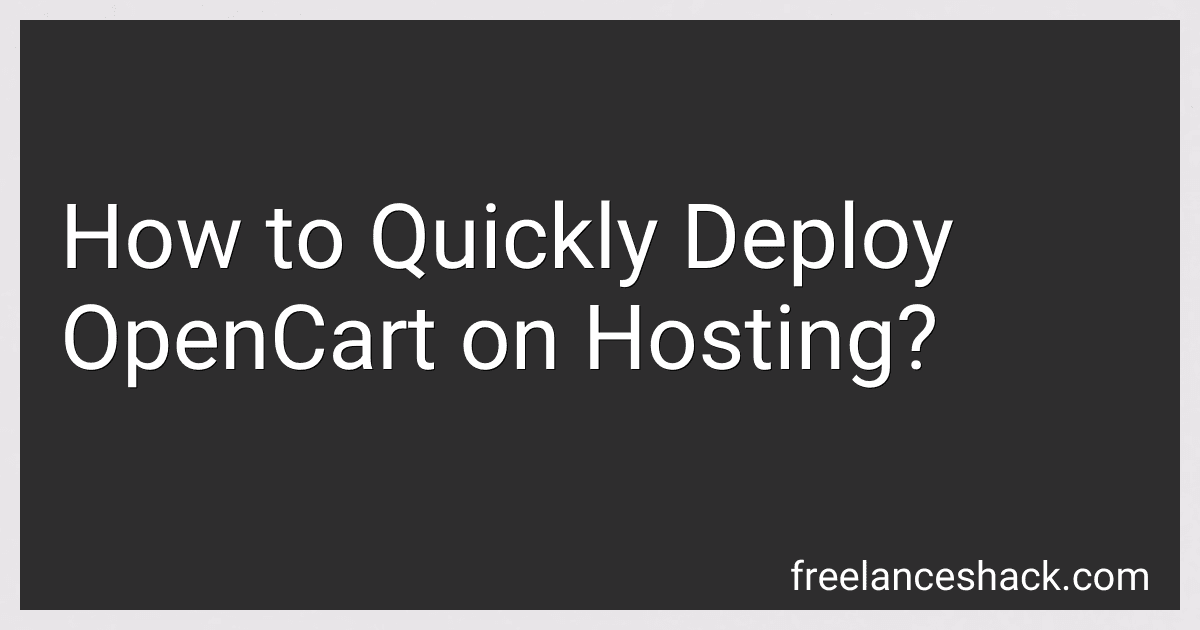Best OpenCart Hosting Solutions to Buy in November 2025
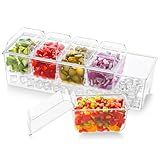
Lifewit Ice Chilled Condiment Caddy with 5x 20oz(2.5 cup) Containers, 15.3" Condiment Server with Separate Lids, Serving Tray Platter with Removable Dishes for Bar, Fruit, Salad, Taco, Party Garnish
- KEEP FOOD FRESH: ICE COMPARTMENT MAINTAINS FRESHNESS FOR HOURS.
- PREMIUM QUALITY: BPA-FREE, CLEAR DESIGN FOR SAFETY AND STYLE.
- VERSATILE USE: PERFECT FOR PARTIES, BBQS, AND GATHERINGS!


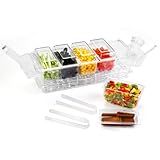
Ice Chilled Condiment Caddy Organizer with Detachable Ice Box & Side Bins, 5 Removable 2.5 Cup Containers with Lids, Clear Garnish Tray Server for Taco Bar, Mimosa, Fruit, Salad, Buffet (BPA-Free)
-
VERSATILE DESIGN: IDEAL FOR ANY EVENT-INDOOR OR OUTDOOR GATHERINGS.
-
PREMIUM QUALITY: BPA-FREE MATERIALS ENSURE SAFE AND VISIBLE FOOD STORAGE.
-
EASY TO CLEAN: DISHWASHER-SAFE FOR HASSLE-FREE MAINTENANCE POST-USE.


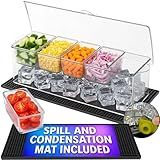
Honeyera Chilled Condiment Server | Hosting Essentials for Up to 80 Oz of Ice | Mimosa Bar Supplies Drain Plug | BPA-Free Taco Bar/Salad Bar | Food-Safe Condiment Caddy (Parent) (Black, 1 Pack)
- PRO-GRADE LOOK: BPA-FREE MAT PROTECTS SURFACES AND PREVENTS SPILLS.
- CHILLED FRESHNESS: ICE CHAMBER KEEPS CONDIMENTS COLD; EASY DRAINAGE!
- VERSATILE USE: PERFECT FOR ANY GATHERING, FROM BBQS TO TACO BARS.


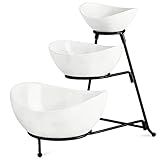
YHOSSEUN 3 Tier Serving Stand with 3 Oval Porcelain Serving Bowl Set with Collapsible Thicker Sturdier Metal Rack (Black)
- STURDY METAL FRAME ENSURES DURABILITY FOR LONG-LASTING USE.
- UNIQUE DESIGN ENHANCES ELEGANCE WHILE PROTECTING YOUR COUNTERTOPS.
- SPACE-SAVING 3-TIER STRUCTURE BEAUTIFULLY DISPLAYS YOUR TREATS.


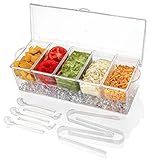
IVYHOME Ice Chilled 5 Compartment Condiment Server Caddy | Fruit Serving Tray | Condiment Pots with 5 Removable Dishes Over 2 Cup Capacity Each and Hinged Lid
- MADE FROM 100% BPA-FREE, SHATTERPROOF PLASTIC FOR SAFE USE.
- TRANSPARENT COMPARTMENTS ALLOW EASY MONITORING OF CONTENTS.
- VERSATILE FOR FRUITS, SALADS, SAUCES, AND MORE-KEEPS FOOD FRESH!



HOOBRO Bar Cart, Home Bar Serving Cart, Kitchen Cart, Rolling Beverage Cart & Wine Rack and Glass Holder 2 Storage Shelves, Cocktail Cart for Home Dining Party, Rustic Brown and Black BF27TC01
-
VERSATILE USE: SERVES AS A BAR, DINING, OR PARTY CART FOR ANY EVENT!
-
AMPLE STORAGE: HOLDS 3 WINE BOTTLES & 9 GLASSES WITH SECURE GUARDRAILS.
-
EFFORTLESS MOBILITY: MOVES EASILY ON 4 WHEELS; LOCKS FOR STABLE USE.


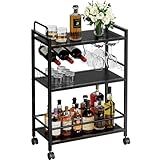
Home Bar Serving Cart, Serving Cart with Wheels and Handle, 3 Tier Rolling Kitchen Cart, Microwave Cart, Beverage Cart with Wine Holder and Glass Holders, for Dinning Room, Living Room, Black
-
VERSATILE DESIGN: USE IT AS A BAR CART, SIDE TABLE, OR MICROWAVE RACK.
-
PRACTICAL FEATURES: EQUIPPED WITH HOOKS, HANDLE, AND PROTECTIVE FENCE.
-
AMPLE STORAGE: 3 TIERS, WINE RACK, AND GLASS HOLDER FOR MAXIMUM CAPACITY.


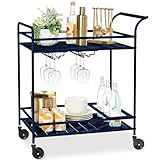
Best Choice Products Rolling Bar Cart, Mobile Home Bar Serving Cart, Serving Station w/ 2 Tier Shelves, Wine Rack, Lockable Wheels - Navy
-
WEATHER-RESISTANT DESIGN FOR VERSATILE OUTDOOR AND INDOOR USE!
-
SPACIOUS 2-TIER SHELVES FOR ORGANIZING ITEMS WITH STYLE!
-
LOCKABLE WHEELS ENSURE STABILITY AND EASY MOBILITY ANYWHERE!


To quickly deploy OpenCart on hosting, follow the steps below:
- Download the latest version of OpenCart from the official website.
- Extract the downloaded OpenCart package on your local computer.
- Using a file transfer protocol (FTP) client, connect to your hosting server.
- Create a new MySQL database using your hosting control panel or any other database management tool.
- Import the OpenCart database file (found in the extracted OpenCart package) into the newly created MySQL database.
- Connect to your hosting server via FTP and upload all the extracted OpenCart files to the appropriate directory (usually the root directory or a subdirectory) on your hosting server.
- Make sure to edit the "config.php" and "admin/config.php" files to update the database details (hostname, username, password, and database name).
- Set the appropriate file permissions for certain OpenCart files and folders as recommended by OpenCart documentation.
- Finally, access your OpenCart installation by entering the URL of your website in a web browser. The OpenCart installation wizard should appear, guiding you through the setup process.
- Follow the on-screen instructions to complete the installation, including setting up an admin username and password.
That's it! You have now quickly deployed OpenCart on your hosting server. You can start customizing your online store by installing themes, adding products, and configuring various settings through the OpenCart admin panel.
What are the essential plugins/extensions for OpenCart?
The essential plugins/extensions for OpenCart can vary depending on the specific needs of your online store. However, here are some commonly recommended ones:
- SEO Pack: Helps optimize your store for search engines, improving your website's visibility and rankings.
- Payment Gateways: Install the appropriate payment gateway extensions to enable smooth and secure transactions for your customers. Popular options include PayPal, Stripe, and Authorize.net.
- Shipping Extensions: Choose shipping extensions that integrate with your preferred shipping carriers or enable custom shipping options.
- Google Analytics: Track website traffic, user behavior, and sales conversions with the Google Analytics extension.
- Social Media Integration: Integrate your OpenCart store with social media platforms to increase brand visibility and improve engagement. Common options include Facebook, Twitter, and Instagram extensions.
- Reviews and Ratings: Allow customers to leave product reviews and ratings to increase trust and credibility. Look for extensions that add this functionality to your store.
- Multi-language and Multi-currency Support: If you plan to sell to an international audience, install plugins that enable multiple languages and currencies for a seamless customer experience.
- Newsletter Subscription: Offer a newsletter subscription option to collect customer emails and send marketing updates. Look for extensions that integrate with popular email marketing services such as MailChimp or Constant Contact.
- Security and Anti-Spam: Install extensions that enhance the security of your OpenCart store by protecting against spam, fraudulent transactions, and potential hacking attempts.
- One-Page Checkout: Simplify the checkout process and improve conversion rates by using a one-page checkout extension.
Remember to carefully review and research each extension before installation to ensure compatibility and security.
How to integrate payment gateways with OpenCart?
To integrate payment gateways with OpenCart, you can follow these steps:
- Select the payment gateway: Choose the payment gateway that you want to integrate with OpenCart. Make sure the gateway supports OpenCart and provides relevant API documentation.
- Obtain credentials: Sign up for an account with the payment gateway provider and obtain the required credentials, such as API key, username, password, merchant ID, etc.
- Install the payment gateway extension: In your OpenCart admin panel, go to the Extensions section and click on the Extensions Installer. Upload the payment gateway extension file (usually in .ocmod.zip format) and install it.
- Enable the payment gateway: After installation, go to the Extensions section again and click on Payments. Look for the installed payment gateway extension and click the "Install" button. Then, click on the "Edit" button next to the extension to configure its settings.
- Configure the payment gateway settings: In the payment gateway configuration page, enter the required credentials and other settings as specified by the gateway provider. These settings may include API URL, API keys, merchant account details, callback URL, sandbox/live mode selection, etc.
- Test the integration: Enable the test mode if available and perform test transactions to ensure that the integration is working correctly. Make small payments using real or test credit cards to verify that the payment process is successful.
- Disable test mode and go live: After completing the testing phase and verifying that everything is working as expected, disable the test mode in the payment gateway settings. Update any other required details (e.g., bank account details) if necessary. Your integration is now ready for live transactions.
- Monitor and resolve issues: Monitor your online store for any issues related to payment processing. Test and confirm that real transactions are being processed correctly. If any issues arise, refer to the payment gateway provider's support documentation or contact their support team for assistance.
Note: The exact steps may vary depending on the payment gateway provider and the version of OpenCart you are using. Make sure to check the documentation or support resources provided by the payment gateway provider for detailed instructions on integrating with OpenCart.
What are the system requirements for running OpenCart?
The system requirements for running OpenCart will vary depending on the version you are using, but here are the general system requirements:
- Web Server: OpenCart is compatible with most web servers, including Apache, Nginx, and Microsoft IIS.
- PHP: OpenCart requires PHP version 5.4 or later. It is recommended to use the latest stable version of PHP.
- Database: OpenCart uses a database to store all the website data. It supports various databases, including MySQL (version 5.0 or later), PostgreSQL, and SQLite.
- Supported Operating System: OpenCart is platform-independent, so it can be installed on any operating system that supports the necessary software (e.g., Windows, Linux, macOS).
- Web Browser: To access the OpenCart admin panel, a modern web browser like Google Chrome, Mozilla Firefox, or Safari is required.
Additionally, depending on the size and traffic of your OpenCart store, you may need to consider the following:
- Adequate disk space for storing product images and other media files.
- Sufficient RAM and CPU power to handle the expected traffic and processes.
- Secure Socket Layer (SSL) certificate for secure transactions if you plan to accept payments online.
It is always recommended to consult the official OpenCart documentation or the version-specific requirements for more specific and up-to-date information.
What are the options for integrating OpenCart with social media platforms?
There are several options for integrating OpenCart with social media platforms. Here are a few common ones:
- Social media login: Allow customers to log in or register on your OpenCart store using their existing social media accounts like Facebook, Google, or Twitter. This simplifies the registration process and improves user experience.
- Social media sharing: Add social media sharing buttons to your product pages and blog posts, allowing customers to easily share your content with their social networks. This helps increase brand visibility and drive traffic to your store.
- Social media widgets: Display the latest posts or feeds from your social media accounts right on your OpenCart store. This allows customers to stay updated with your social media activities and encourages them to engage with your brand.
- Social media advertising: Integrate social media advertising platforms like Facebook Ads or Instagram Ads with OpenCart to create targeted ad campaigns and retarget customers who have previously visited your store. This helps drive sales and increase conversion rates.
- Social media product feeds: Generate product feeds from your OpenCart store and distribute them to social media platforms like Facebook, Instagram, or Pinterest to showcase your products to a wider audience. This can help increase product visibility and drive more traffic to your store.
These options can be achieved by using dedicated OpenCart extensions or by custom development based on your specific requirements.
What are the options for managing customer accounts in OpenCart?
In OpenCart, there are several options for managing customer accounts:
- Customer Registration: Customers can create an account on your store by registering with their email address and setting a password. The registration form usually includes fields like name, address, and contact information.
- Account Dashboard: Once customers have registered, they can log in to their account and access their dashboard. The dashboard provides various functionalities like order history, address book management, newsletter subscriptions, and account settings.
- Customer Groups: OpenCart allows you to categorize customers into different groups based on their behavior or preferences. You can create custom groups and assign privileges or discounts to specific groups.
- Account Modification: Customers can modify their account details like name, email address, password, and shipping/billing addresses from their account dashboard.
- Forgotten Password Recovery: If a customer forgets their password, OpenCart provides the option to recover it via email. The customer receives a password reset link to their registered email address.
- Newsletter Subscriptions: Customers can subscribe or unsubscribe from newsletters in their account settings. You can use this feature to send promotional or informational emails to subscribed customers.
- Order History: Customers can view their previous order details, including order status, tracking information, and invoices. This allows them to keep track of their purchase history.
- Wishlist: OpenCart offers a wishlist feature where customers can save products they are interested in for future purchase. They can also share their wishlist with others or use it as a personal reminder.
- Reviews and Ratings: Customers can leave reviews and ratings for products they have purchased. This helps other customers make informed decisions and also provides valuable feedback to the store owner.
- Account Deactivation: In certain cases, store owners may need to deactivate or delete customer accounts. OpenCart provides options to disable or delete accounts if necessary.
These are some of the main options for managing customer accounts in OpenCart. Depending on the specific needs of your store, you can further customize and enhance these functionalities using extensions and plugins available in the OpenCart marketplace.
